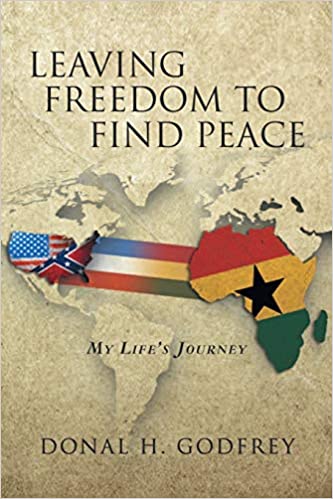Title: Leaving Freedom to Find Peace: My Life’s Journey
Author: Donal H. Godfrey
Publisher: Westwood Books Publishing, LLC
ISBN: 1643619292
Pages: 206
Genre: Autobiography
Reviewed By: Dan MacIntosh
Hollywood Book Reviews
The test of a life lived well is to get better, and not become bitter when enduring hard times. It’s easy to become angry and blame the world for all your troubles. However, it’s far wiser to learn from these struggles and make a better life for yourself. Such is the case with Donal H. Godfrey, who tells his life story with Leaving Freedom to Find Peace: My Life’s Journey. Godfrey’s life journey has rarely been easy, but he will almost certainly end his life in a better place than where he began it.
When we look back on the Civil Rights Movement of the ‘60s, we mainly focus on its more positive moments. We well up with patriotic pride whenever we think back on Rosa Parks’ bravery and Martin Luther King Jr.’s speeches. These are two American heroes, and all should agree they are to be remembered fondly and reverently. However, what we sometimes gloss over – and yet shouldn’t ever overlook – is all the pain caused and all the lives which were lost or damaged during this epic struggle. The Civil Rights Movement was a war fought with multiple battles, and many people came out of that time with deep scars. One such victim was Godfrey. Raised in the South — Jacksonville, Florida, to be precise – Godfrey was brought up in a region where the Ku Klux Klan was both active and dangerous. Proving this point, the Klan bombed his family home because Godfrey (who is black) dared to attend and all-white elementary school.
Godfrey could have easily lost all his faith in humanity. After all, why would human beings treat their fellow humans so cruelly? Granted, this tragic experience did make Godfrey much more aware of the racial components of American life. The reader gets the sense Godfrey believes systemic racism is real. All throughout this book – a work that is, to put it simply, his life story, Godfrey relays various memories where he experienced racism first-hand. Although I am not black, all my black friends tell similar stories. Yes, America ended slavery and abolished the most egregious Jim Crow laws, but racism is a deep and enduring human flaw, which will always require vigilant resistance.
The best parts of Godfrey’s book include those experiences where he makes himself a better man. There was a point in his life, for instance, where he voraciously read black history books. Yes, you can learn much about life from watching the news and having long talks with your peers, but one of the very best ways to better yourself is to read books by learned men and women. Another turning point experience in Godfrey’s life was attending the Million Man March in 1995. Listening to Louis Farrakhan speak and being surrounded by so many men committed to solidarity greatly encouraged Godfrey to be actively engaged in ethnic pride.
Godfrey spent much of his early life serving his country in the military. He also earned his bachelor’s degree and master’s degree relatively late in life. These days, he continues to study African history and lecture at various colleges. While many African Americans preach about the need to study and their African roots, Godfrey has put his money where his mouth is – so to speak — by emigrating from the United States to his adopted African home of Ghana.
Yes, you can say Godfrey’s life story has involved a clear geographic journey. Perhaps, though, Godfrey’s internal journey has been even more significant. He could have settled for being a victim, even though he was quite obviously victimized. Even so, his life journey has taught him that his personhood and ancestry make him so much more valuable than the lowliness the Ku Klux Klan attempted to make him feel. In the end, Godfrey’s story is one big victory for freedom.

